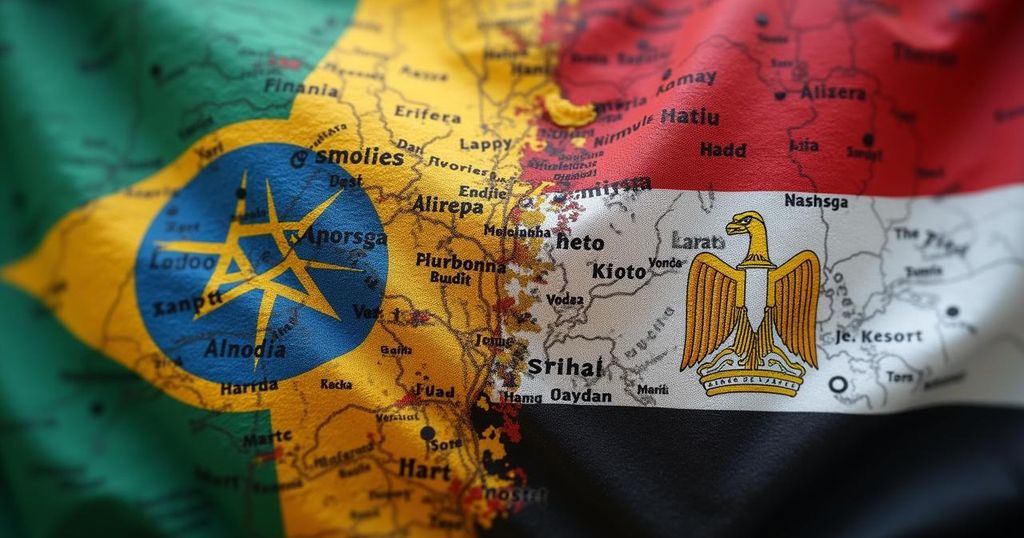Eritrea, Egypt, and Somalia are strengthening their diplomatic ties against Ethiopia, following a summit in Asmara. The meeting highlights mutual concerns over sovereignty and security amidst Ethiopia’s aspirations for maritime access and regional influence. Increased military cooperation between Egypt and Somalia, coupled with historical tensions over the Nile River and territorial disputes, could potentially lead to heightened conflict in the region.
The leaders of Eritrea, Egypt, and Somalia have convened in Asmara, Eritrea’s capital, to strengthen their coalition against Ethiopia, a nation they all regard with suspicion. An official statement from Eritrean authorities emphasized their commitment to respecting the sovereignty and territorial integrity of the regional nations, which may indirectly address Ethiopia’s ongoing pursuit of a coastline for maritime access. Following recent diplomatic tensions, Somalia has gravitated closer to Egypt and Eritrea, both of which have historical disputes with Ethiopia, raising concerns about potential conflict. Hassan Khannenje, the director of the Horn International Institute for Strategic Studies, remarked, “This is an axis against [Ethiopian capital] Addis Ababa. I think it’s an attempt to bring the hate together in trying to increase pressure against Addis Ababa.” A photograph circulated by Eritrean officials displayed President Isaias Afwerki alongside Egyptian President Abdul Fattah al-Sisi and Somalia’s President Hassan Sheikh Mohamud, reflecting their collaborative efforts. The trio committed to enhancing Somali state institutions to confront a variety of challenges, including terrorism. This meeting marks President Sisi’s first official visit to Eritrea, while President Mohamud has attended multiple times this year. For years, Ethiopia has supported Somalia in its efforts against the insurgent group al-Shabaab. However, tensions have escalated following Ethiopia’s preliminary agreement with the self-declared republic of Somaliland, which Somalia claims as its territory. Additionally, over the past decade, strained relations have persisted between Ethiopia and Egypt regarding the construction of a massive dam on the River Nile, which Egypt fears will reduce its essential water supply. In a display of military partnership, Egypt recently supplied Somalia with military equipment, indicating a strategic alignment against Ethiopia. In 2018, it appeared that relations between Ethiopia and Eritrea had normalized following a peace declaration, which earned Ethiopia’s Prime Minister Abiy Ahmed a Nobel Peace Prize. However, the resurgence of tensions came after the Ethiopian civil war ended, with Eritrea remaining a complex ally. Abiy Ahmed’s ambition for port access on the Red Sea has only further soured relations between the nations.
Eritrea, Egypt, and Somalia are countries in the Horn of Africa that have historically had contentious relationships with Ethiopia. These tensions are rooted in territorial disputes, competition over resources, and historical conflicts. The recent summit in Asmara signifies a shift towards cooperation among these nations in light of Ethiopia’s aspirations for regional influence, particularly with its ongoing goal to gain maritime access. Somalia’s discontent regarding Ethiopia’s agreement with Somaliland is a pivotal factor in its realignment, as is the longstanding disagreement between Ethiopia and Egypt over water rights related to the Nile River. The region is characterized by complex geopolitical dynamics that could escalate into conflicts, necessitating careful diplomatic handling.
In summary, the summit in Asmara signifies a strategic alliance among Eritrea, Egypt, and Somalia, with the united goal of countering Ethiopian influence in the region. Diplomatic strains following Ethiopia’s actions towards Somaliland and its hydroelectric development have fostered a climate of distrust and potential conflict. As these nations solidify their coalition, the prospect of escalated tensions in the Horn of Africa remains a critical concern.
Original Source: www.bbc.co.uk






